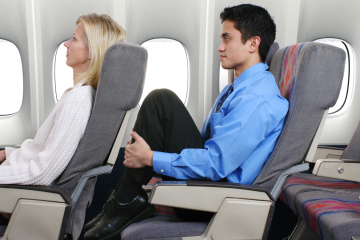
Many of us travel to warm locations during the winter or start planning summer vacations. One concern about being confined to a car or airplane for lengthy travel is the possibility of developing deep vein thrombosis (DVT).
DVT affects about 2 million Americans a year, and nearly 200,000 die. In DVT, blood clots form in the deep veins of the lower leg and thigh. A DVT can break loose and cause a serious problem in the lung, called a pulmonary embolism, or lodge in the brain, heart or other area causing severe damage or death. In addition to limited movement, other risk factors for DVT include increased estrogen, chronic illnesses, and obesity.
The common symptoms of DVT are warmth and tenderness over the vein, pain or swelling in the part of the body affected, and skin redness. Symptoms of a pulmonary embolism include shortness of breath, chest or back pain, coughing, sweating, and lightheadedness, among others. To minimize the potential for DVT when traveling, get up and walk around every two hours and try not to sleep more than four hours at a time. If it’s not possible to move around, try extending both legs and moving feet back and forth in a circular motion. Bring each knee up to the chest and hold for 15 seconds. Put both feet on the floor and point them upward, then lift both heels as high as possible. Drink plenty of fluids and wear loose fitting clothing. It’s better to eat light meals and limit alcohol consumption. For seniors or others with circulation problems, it’s often helpful to wear compression stockings. It is a good idea to consult your doctor prior to travel since some suggest going on blood thinners or taking an aspirin before and during long trips to prevent DVT.
Visit RVNA at www.ridgefieldvna.org